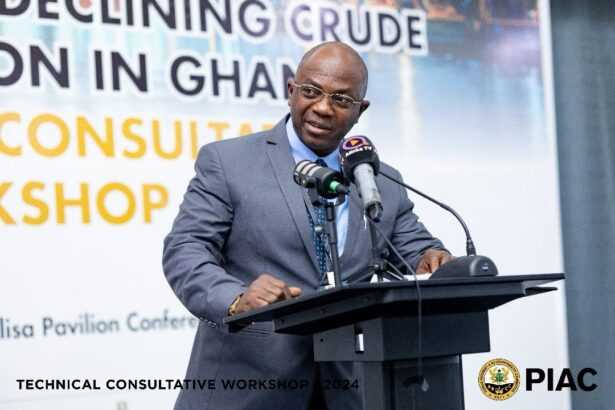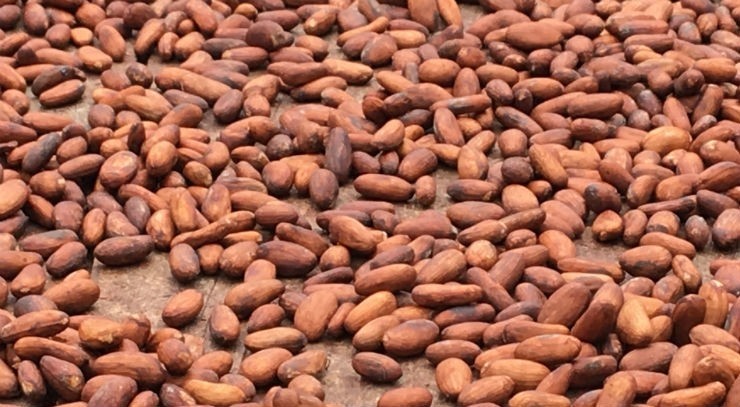The Public Interest and Accountability Committee (PIAC), responsible for overseeing the use of Ghana’s petroleum revenue, has proposed a set of measures to address the ongoing decline in the country’s crude oil production.
To tackle this issue effectively, PIAC advocates for a comprehensive approach that includes economic diversification, sustainable management of petroleum resources, a shift towards renewable energy, and the development of local industries.

Mr. Constantine K.M. Kudzedi, a member of PIAC, emphasized these recommendations during a consultative workshop in Accra on October 16.
“While building a resilient economy and adapting to the global shift in energy, Ghana must ensure the sustainable growth of its upstream oil and gas sector,” Kudzedi stated at the workshop.
Decline in Production and Its Impact
PIAC highlighted that Ghana reached its peak crude oil production in 2019 with 71.4 million barrels, following a steady increase from about 1.1 million barrels in 2010 to 62 million barrels in 2018. However, production dropped to 66.9 million barrels in 2020—a 6.3% decrease. The decline continued in subsequent years, with production levels falling to 55.1 million barrels in 2021, 51.8 million barrels in 2022, and 48.2 million barrels in 2023. The 2023 figure marks the fourth consecutive year of declining output.
Kudzedi warned that without addressing challenges in current oil fields, attracting new investments, and bringing new fields into production, the future of Ghana’s upstream petroleum industry is at risk. The continued decline could jeopardize the expected returns and share of oil wealth for stakeholders, especially the state.
Challenges Facing the Industry
Several factors have contributed to the decline in production. Key among them is the maturing of Ghana’s flagship Jubilee oil field, which began production in 2010. After peaking in its first nine years, the field is now experiencing natural declines. The Tweneboa-Enyenra-Ntomme (TEN) and Sankofa Gye-Nyame (SGN) fields have faced similar challenges, with both following a natural decline curve. While the SGN field remains a significant gas producer, both fields require further investment to maintain output levels.
In addition to aging fields, Ghana has seen a drop in new oil discoveries, partly due to a lack of investment in exploration activities. Global shifts toward renewable energy have also made investors more cautious about long-term commitments to fossil fuel projects in Ghana.
Operational and Technical Setbacks
Technical issues have further hampered production, with equipment malfunctions and maintenance delays affecting output. Inadequate infrastructure for processing, transporting, and storing oil and gas has also limited production capacity. Delays in projects, such as the expansion of gas processing plants, have slowed down production rates.
Global Energy Transition and Its Impact
The global shift towards renewable energy has introduced uncertainty about future demand for crude oil, affecting investor interest in Ghana’s oil sector. As major investors move away from fossil fuel projects, capital for new exploration and production in Ghana has diminished. This shift raises the risk of existing oil reserves becoming “stranded assets” as renewable energy technologies become more competitive.
Economic and Social Implications
The decline in crude oil production has immediate economic implications, including reduced government revenue. Petroleum revenue, which contributes about 7% of Ghana’s total government income, is crucial for funding key services like healthcare, education, and infrastructure. A continued drop in oil production could lead to budget shortfalls, slowing down economic growth and development.
The reduction in production also poses a threat to employment in the oil and gas sector. A drop in output could force international oil companies to scale back operations, resulting in job losses and impacting related industries such as transportation and manufacturing.
Looking Ahead
PIAC warns that if these challenges are not addressed and new reserves are not discovered, the long-term sustainability of Ghana’s oil production remains uncertain.
The committee continues to urge the government and stakeholders to take action to secure the future of the country’s upstream petroleum industry.
























































![[FREE FREE MONEY] Predict and Win a Guaranteed GH¢200 From Us EVERY WEEK](https://wordpress.ghanatalksradio.com/wp-content/uploads/2022/02/Predict-and-Win-Final-09-03-2021-218x150.jpg)
![[Predict & Win – 8th/Oct.] WIN A Guaranteed ¢200 From Us This Week](https://wordpress.ghanatalksradio.com/wp-content/uploads/2021/10/maxresdefault-16-218x150.jpg)
![[Predict & Win – 2nd] WIN A Guaranteed ¢200 From Us This Week](https://wordpress.ghanatalksradio.com/wp-content/uploads/2021/09/maxresdefault-50-218x150.jpg)
![[Predict & Win – 25th] WIN A Guaranteed ¢200 From Us This Week](https://wordpress.ghanatalksradio.com/wp-content/uploads/2021/09/maxresdefault-36-218x150.jpg)
![[Predict & Win – 18th] WIN A Guaranteed ¢200 From Us This Week](https://wordpress.ghanatalksradio.com/wp-content/uploads/2021/09/maxresdefault-23-218x150.jpg)







![[National cathedral] See full list of churches that have contributed since 2018](https://wordpress.ghanatalksradio.com/wp-content/uploads/2020/09/Ghana-National-Cathedral-GhanaTalksRadio-100x70.jpg)



